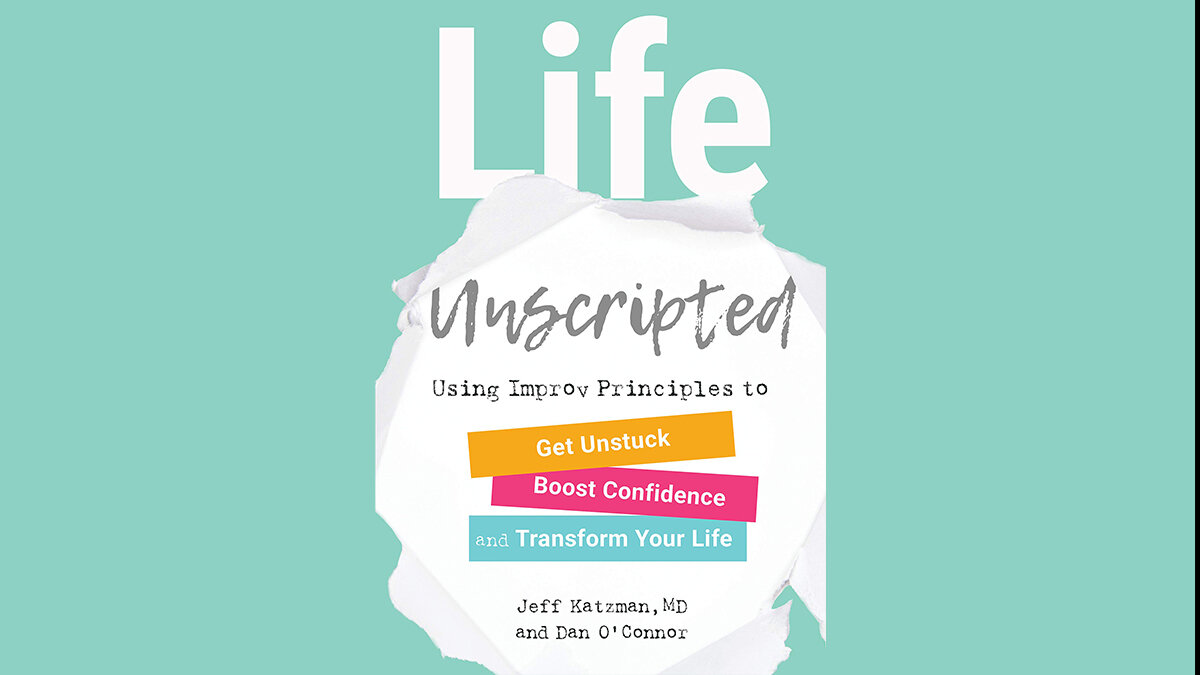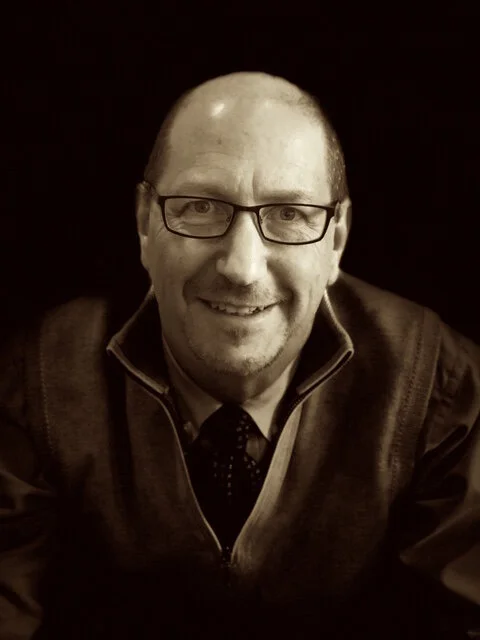A M-B INTERVIEW W/ JEFF KATZMAN, M.D.: A PSYCHIATRIST'S TAKE ON IMPROV
In our marketing here at The Making-Box, one of the things we try to communicate is that improv isn’t just for actors. In fact, most our students aren’t of the theatrical persuasion. They come from all parts of life. Life skills with wide applications like: being present, communicating effectively, being authentic, and so much more are learned in improv classes.
So, we were pleasantly surprised when one day an improvising psychiatrist, Jeff Katzman and co-founder of Theatresports LA, Dan O’Connor, emailed us out the blue. They told us they’ve literally written the book on improv being a valuable tool set for everyday life. The main thesis of their book was: transcending our typical “scripted” roles in life through the tools of improv, can open ourselves up to all kinds of new experiences, new skills, and new appreciation of the people around us.
Life Unscripted: Using Improv Principles to Get Unstuck, Boost Confidence, and Transform Your Life is a wonderful breakdown of how the tools and skills learned in improv aren’t just for the stage. Jeff and Dan write about how learning to do theatre in an unscripted way, can help people move away from their typical “scripted roles” into new and exciting areas of life.
Naturally, I jumped at the chance to have a deeper conversation with these authors about their new book. Below is part one of the interview with Jeff Katzman, a clinical psycologist based out of the University of New Mexico.
(Note: some of our conversation has been edited for length and clarity)
B: I wanted to start by learning more about how you and Dan came to know each other. How did it go from improv class to writing this book?
JK: We met when I was a resident at UCLA in the psychiatry program. I was in the training program at The Second City. I had auditioned on a dare. Second City had just moved out to LA to start the western branch…and a group I was improvising with heard about Theatresports LA, which was a company Dan had started...
We had a great time. And Dan had a certain way of working with us. So at a certain point, I got very involved with improv and mental health. And I started doing it with patients at the Imagination Workshop in LA with seriously mentally ill patients. And I did it with the aim of helping people. And I was starting to realize there was something with improv and teaching people to relate, that you couldn’t learn in medical school.
I stayed really interested in this subject when we moved [Jeff and his family] to Albuquerque, New Mexico to raise our family. And I joined the faculty here at UNM (University of New Mexico), but Dan and I stayed in touch and kept missing each other. And I think it was about 6 years ago, we started realizing we were really thinking about the same things [in regards to improv]. Him, with people coming to workshops, and me with clients I was working with in various ways. So, Dan and I got to talking and we were both so excited...and then we started talking every week and sharing ideas.
B: Are you still practicing improv, and doing it for fun in New Mexico?
JK: Yes. I’ve done it on and off for about 30 years. There was no improv company when I first moved here and then a theatre opened and I worked with them for a few years and they closed and became The Box Theatre [no relation to The Making-Box]. I take classes on and off at The Box. And I am just a class junkie. When I take classes, I do much better work, I’m much better with patients. I like to take classes because it makes me a better person. I’ve done a lot with the application of improv and teaching it to medical students, and psychiatry residents.
And we’ve worked with the New Mexico Analytic Society here and then I got trained how to do [improv] with scientists. We’ve worked with many, many scientists to use improv to get to their underlying message and learn to connect with their audiences.
B: That’s a great use of those skills. What are some of the ways that happens with scientists?
JK: Scientists often get very involved with the idea it is they’re working on, not many other people can understand these ideas at the same level a scientist can. So they kind of lose their audience. But part of the scientific method is to share your work and so it can lead to a sense of depletion, and isolation and questioning, “what is the value of what I am doing?” We watch scientists transform over just two days of improv perform better in distilling a message. Being able to apply these skills [of improv] to actually become much more human in the telling of their story.
B: That’s interesting you use the word “human” to bring about that idea of connecting with people and imagination and play. It’s funny those traits are very uniquely human elements, but often are some of the first things to go when you transfer from childhood to adulthood.
JK: Right. What I’m really experienced with is working with doctors. And in particular, we as physicians, we study and we study and we jump through these hoops, and we pass these tests and then we learn about the science of medicine and then we learn about scales for depression, scales that we can ask our patients. That’s a professionalizing script. You have to be able to embrace that script, just like any profession.
But then, you have to learn how to un-embrace it. You have to bring yourself to the story. You have to ask “who am I as a doctor? Who am I uniquely that will be able to connect uniquely with this individual?”
Because this person isn’t just coming to see a doctor. They’re looking for a person. So we can get back to our humanity and find ways of connecting that are very natural, but that we unlearn.
B: So you have a lot of experience using improv as a treatment and therapy. It seems improv can come in handy as a clinical practice? Can you explain more how it comes into play?
JK: I still have a pretty big clinical practice right now. I don’t right now use it clinically with patients. Though I have, and it was remarkable. There’s a group called The Imagination Workshop that I was part of during residency when I was first learning improv... So these are patients with schizophrenia and adult autism. And these people were able to do improv in remarkable ways. They were able to transcend their usual ways of relating to people. It was something to watch.
I was medical director and so I participated with the clients in the group while two improvisers led this for a week every year. I think it’s a really important role when you’re doing something like this, that you have improvisers leading improv and the physician or the therapists participating yet monitoring how people are doing and also serving the buffer….
There’s something about [making it clear] that I’m not an improviser, I’m a psychiatrist who thinks this is important.
So I watched those people connect with each other in groups, develop characters, then they made masks for the characters… and it’s still going on. These imagination workshops.
I also ran a group myself with Vietnam Veterans, who had returned from combat. And we did an hour group once per week, and as I described in the book, I would ask, “where are we going today?” As a group we would create a place, and then a character in this place, and then we’d set up interactions around these parameters. And we would just play. And it was wildly wonderful to see how they were just able to play.
B: Yes that’s huge. Especially if you’re a veteran coming back from some understandably heavy stuff. To get that sense of play back must be a bit of a challenge, a bit of a necessity, or both?
JK: I would also say, when I was writing with Dan, we would talk on the phone once per week. And once I would hang up the phone I would have much more energy thinking about these concepts for the rest of my day. So there’s something about improv that is energizing and playful, and even thinking about it, which will give me a lot of energy to take on administrative roles or take on things that might seem more difficult.
B: I’ve definitely experienced that. The little boost you get from after two hours of doing improv. Because your imagination opens up. What do you think it is about improv that brought out a different part of the people you’ve worked with?
JK: I think it was really the permission to interact. And the permission to be playful. To make sure that things stayed safe and that no one was entering these pretend places and characters and losing touch with reality. But I think often, because of the stigma of mental illness, patients are often not included or seen by the rest of the world in a certain role.
I think [improv] allows patients, like it allows all people, to get out of our role. I think people are desperate to unscript their regular role.
B: I think the word permission here is important. It’s how to transcend an identity as “person with a mental illness” or “patient.”
JK: Yes. And the stigma with which their treated a lot of times in the world.
B: Yes that’s huge. And I don’t think a lot of people would consider the power a simple role-playing exercise can have. Or any of the quote-on-quote “silly games” in improv can so just to get people out of their regular roles.
JK: Yes exactly. And actually just relating.
B: In the book you talked a lot about a shift that happens when you’re a child to adult where you lose two main things: a sense of play and a sense of imagination. What do you think happens between childhood and adulthood that causes these things to fall to the wayside?
JK: Play and imagination is an expected part of behaviour for kids. Kids colour, kids have play dates, kids are invited into their imagination during school. Our adult version of that is usually paired with alcohol or drugs or something like that. It’s a indication to me that there’s a desperate need to want to play and play beyond our usual roles. We get into roles of “i’m going to grow up to be this, so I need to do this, and this, and this.”
I think it’s worse now, because adults have gotten into the world of organizing kids’ play. Kids used to play soccer on the street or whatever, and just play. But now they’re in soccer leagues, and they’re tracked in terms of how “good” they are. And the family organizes around them and parents are the coaches, and it’s a whole production centred around activity as opposed to actual play and imagination. So I think we are even losing it in our growing up.
B: I know a big thing you mentioned in your book is that improv can remove a sense of self-judgement and self-criticism as well.
JK: It can also get it going [laughs]. In my experience of being in a lot of improv classes, and not being the most gifted of improvisers, I can just say to myself “oh my gosh, this is just a bad day, what am I doing? I can’t even do this. Why am I 55 years old trying to improvise?” I can go in a hole… You become aware of who is this and what is this voice inside of me that’s criticizing what I do, and then I can’t do improv.
B: Yeah exactly. If you want to do improv well you have to let go of those inner voices.
JK: Right. Which I think that’s what gifted improvisers are able to do very well, to get beyond that place.
B: Totally. Seeing things as opportunities and not fears or challenges.
JK: Right. But the rest of us, who spend most of our lives taking tests and trying to do well, here’s a quote, “performance” thing that can be scary. Saying, “oh I what I did was really lame, no one is going to want to go with me next time.”
B: You’re the expert on this, but the way you talk around performing and recognizing the people in the moment sounds a lot like my experience with CBT (Cognitive Behavioural Therapy). Do you notice any similarities?
JK: I think so. My bias is not CBT. My bias is more psychodynamics and psychotherapy. We’re dealing with the underlying emotionality that causes behaviours. But it is similar. Cognitive distortions and self-judgements are certainly a part of CBT and recognizing those. And it’s even just part of a mindfulness experience. Coming to understand what is this self talk, and who is punishing me right now, and what if I just let it go?
And in the psychodynamic world we spend time figuring out where do these voices come from. And trying to undo or get to the heart of the issue.
I want to thank Dan and Jeff for sharing their time and insight. Read the second part of the interview with Theatresports LA founder, Dan O’Connor here.
If you want to read the book, you can buy a copy here, or come down to our M-B improv library where we have a copy you can borrow.





